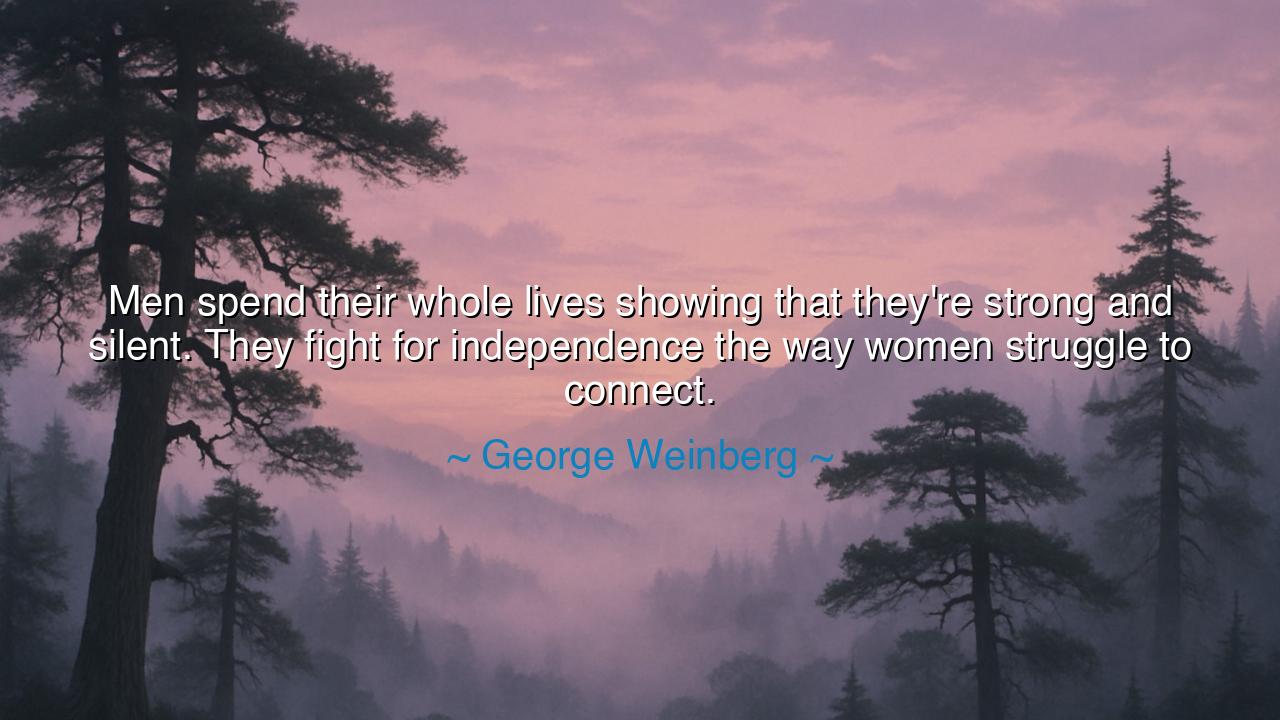
Men spend their whole lives showing that they're strong and
Men spend their whole lives showing that they're strong and silent. They fight for independence the way women struggle to connect.






Listen closely, O children of wisdom, to the words of George Weinberg, for they speak to the profound truths of human struggle and the often silent battles we each face. "Men spend their whole lives showing that they're strong and silent. They fight for independence the way women struggle to connect." In these words lies the heart of a powerful observation about the contrasting ways in which men and women express their deepest desires and needs. Weinberg draws upon the tension between the struggle for independence and the yearning for connection, illuminating how these two fundamental drives shape the way we live, love, and relate to one another.
Independence, O children, is a trait often celebrated in the masculine spirit. Men are taught from an early age to stand firm, to be strong and silent, to forge their own paths without reliance on others. This drive for independence can be a noble pursuit, for it calls one to develop self-sufficiency, to meet life’s challenges head-on and without fear. Yet, in this pursuit, there is often a hidden cost—the silence that accompanies it. The stoic warrior, the solitary hero, is not just a figure of strength but one who, at times, shuts out the possibility of connection with others. The very act of fighting for independence—fighting to maintain the appearance of strength—can prevent men from seeking or receiving the support they need, and from embracing the power of shared vulnerability.
Consider, O children, the story of Hercules, that ancient hero of Greek myth, who was known for his immense strength and feats of bravery. Yet, despite all his triumphs, Hercules suffered in silence, unable to express the depth of his emotional pain and struggles. His quest for independence—his desire to prove his strength to the gods and to the world—isolated him from others. This made him blind to the fact that true strength is not the ability to stand alone, but the courage to admit one’s needs and to accept help when it is offered. His story teaches us that the battle for independence can leave one isolated, and that real strength lies in the ability to connect with others, to recognize that the bonds we form with others are part of what makes us truly powerful.
On the other hand, women, as Weinberg suggests, fight a different battle. They do not struggle for independence alone, but for the very connections that give their lives meaning. From a young age, women are taught to value relationships, to nurture those around them, and to seek bonds with others. Yet, this struggle to connect is often fraught with its own challenges. Women may find themselves torn between the desire for connection and the expectation to maintain their own autonomy. Like the myth of Penelope, who waited years for her husband Odysseus to return, women must often navigate the tension between maintaining their independence while also seeking the closeness and understanding that relationships provide. The desire to connect can be both a source of strength and vulnerability.
Think of the women of the Civil Rights Movement, who, though often in the shadows of Martin Luther King Jr. and other male leaders, played an indispensable role in the fight for justice and equality. These women, like Rosa Parks and Coretta Scott King, fought not only for their freedom but also for connection—connection to their community, to their families, and to each other. In their fight for civil rights, they understood that independence from oppression could not be achieved in isolation. Their strength lay in their ability to connect, to build movements, and to support each other through the hard struggle. Their battle was not just one of personal freedom, but of collective unity—a unity that would, in time, change the course of history.
From these examples, O children, we can draw a profound lesson: the battle for independence and the desire to connect are not opposing forces but complementary aspects of the human condition. We all face these struggles, though we often experience them in different ways. Men, in their pursuit of independence, may unknowingly shut themselves off from the connections that sustain them, while women, in their pursuit of connection, must guard against losing their own independence in the process. The key is finding balance—honoring the need for self-reliance while also embracing the strength that comes from relationships and shared experiences.
Therefore, O children, let us seek to live lives that honor both independence and connection. Let us recognize that strength does not come solely from standing alone, nor does connection come only from sacrificing autonomy. Instead, let us learn to cultivate the courage to be independent when necessary, and the wisdom to open our hearts to the relationships that provide us with the support, understanding, and love that make our lives truly rich. In doing so, we will find the true meaning of strength—a strength that arises not from isolation, but from the bonds we form with others, and the independence we maintain in the face of life’s struggles.






AAdministratorAdministrator
Welcome, honored guests. Please leave a comment, we will respond soon